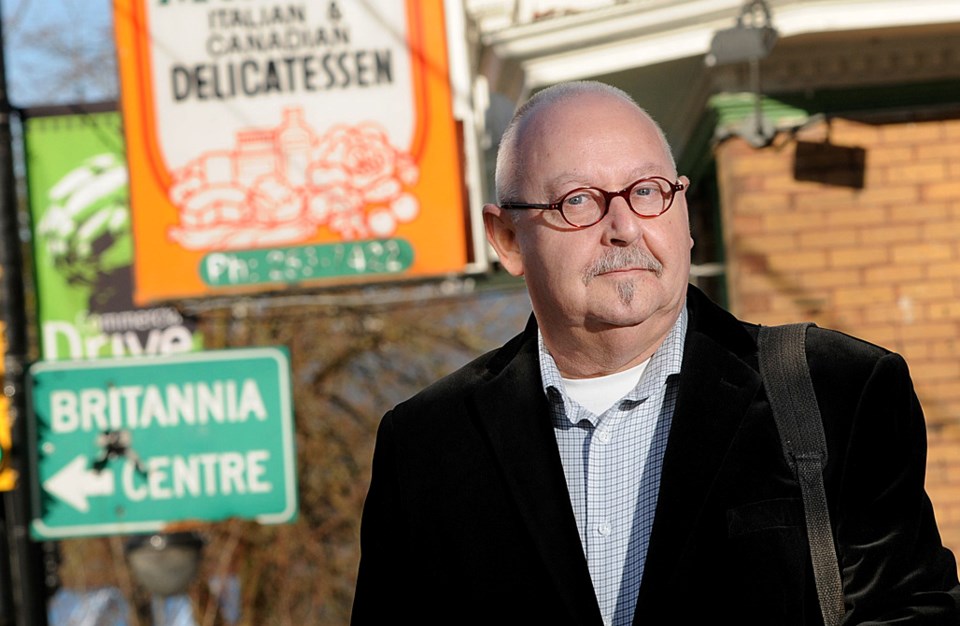Eighteen residents associations from across Vancouver have banded together to “fix” what they consider a “planning mess.”
They cite concerns such of those surrounding the Marpole, Grandview-Woodland, Downtown Eastside and West End community plans, as well as questions about developments around False Creek, Norquay, on the Pearson-Dogwood lands, the Rize project in Mount Pleasant and what they’ve dubbed the “downtownification” of Oakridge through the proposed redevelopment of the mall.
“We’re going to work amongst ourselves to create a new sort of planning paradigm, which we’ll present probably between now and the election,” explained Jak King, a spokesman for the Coalition of Vancouver Neighbourhoods and the president of the Grandview-Woodland Area Council. “We’ll work on it over the next few months and we’ll present it sometime next year and see how it flies.”
King, who’s retired, has lived in Grandview-Woodland for 23 years.
City council recently extended the timeline for the Grandview-Woodland Community Plan following widespread opposition to its initial proposals. Council also granted the controversial Marpole Community Plan a short extension.
King said he’s not affiliated with any political party and that it would be a mistake to think that the coalition is politically motivated or aims to unseat the current Vision Vancouver-dominated council.
“There’s no political party behind any of this coalition. We’re all much more concerned with our local areas,” he said.
King contacted groups from other neighbourhoods whose community plans were being updated this summer after the contentious Grandview-Woodland initial plan was revealed.
“From that it seemed logical to make a much larger group because every neighbourhood seemed to be having the same trouble and that’s proven to be the case. They came together very quickly… it’s strength in numbers and I think it’s to try to explain to the council that their relationship with the neighbourhoods has simply failed for a number of years, but certainly this summer,” he said. “It’s going to be more difficult for them to try and divide and conquer — picking off one neighbourhood after another. We will be working together, making sure that we act as a group.”
The Dunbar Residents’ Association also belongs to the coalition.
Its president Jonathan Weisman says the group is committed to the idea that communities should play a central role in planning decisions that affect the look and feel of neighbourhoods. He believes the coalition can play a role in developing a better framework to make sure that happens.
“The city is fairly keen to have a single plan in place for what it terms consultation and what we have to say is we think there are improvements that can be made,” he said.
Although city staff recently rejected a rezoning proposal for a high-end seniors facility in Dunbar, as well as a proposed development on the Stong’s Market site, Weisman said the residents’ association is interested in improving the planning process.
“There were aspects of the [Stong's] consultation process, which whatever the outcome, we thought could be improved. That’s what we want to bring to the table and that’s what we think everyone will benefit from,” he said.
Criticism about development has been growing in Vancouver. Between 200 and 250 protesters rallied at city hall Sept. 24, a day before council debated the community plans, although rally organizers had hoped for 600.
King maintains concern about development and planning has existed for several years.
“Many of us think that a lot of the problem started with Sam Sullivan’s EcoDensity, which was an NPA initiative, so it’s not strictly Vision [that’s responsible],” he said. “I think Vision took over that view of life, so at the moment it’s definitely Vision pushing this, but as I say, historically it goes back to the NPA times.
“We all understand and everyone recognizes that the city is growing and so we need to deal with that. Because of our geographic situation, obviously densification is a requirement — it’s how that densification is handled and most specifically it’s a question of the neighbourhoods having some significant influence on how that’s handled. We’ve heard many architects [say] and many of us believe that you don’t need to solve densification with 30-storey towers. There are far more creative ways to do it that don’t damage neighbourhoods. It’s our communities and it has to be our plans, and that really is the slogan we move on to.”
The Coalition includes Arbutus Ridge Community Association, Crosstown Residents Association, Downtown Eastside Neighbourhood Council, Downtown south/Yaletown, Dunbar Residents Association, False Creek Residents Association, Grandview Woodland Area Council, Citygate Intertower Group, Marpole Residents Coalition, Norquay Residents, NW Point Grey Homeowners Association, Oakridge Langara Area Residents, Residents Association of Mount Pleasant, Riley Park/South Cambie Visions, Strathcona Residents Association, West End Neighbours, West Kitsilano Residents Association and West Point Grey Residents Association.
noconnor@vancourier.com



